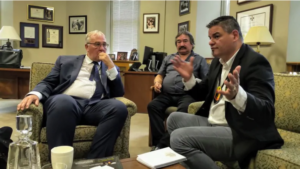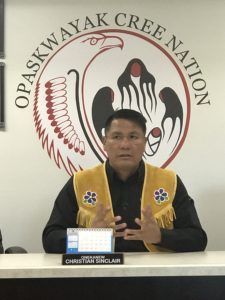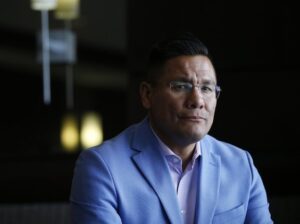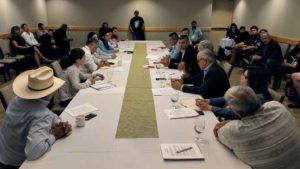From cbc.ca link to article by Sean Kavanagh, Dec 27 2018
For a man who doesn’t smoke, drink or gamble, it might seem odd the cannabis business was calling to him — but Opaskwayak Cree Nation Onekanew (Chief) Christian Sinclair smelled something, and it was giving off a financial buzz.
The soft-spoken (but fast-paced) head of the Manitoba First Nation — next to The Pas, and 520 kilometres northwest of Winnipeg — isn’t interested in labels that underscore his investments in cannabis commerce.
Marijuana kingpin? Cannabis chief? Sinclair wants none of it.
“I don’t use titles. I don’t use anything. It’s just Chris,” he said, with the same self-deprecation he appears to bring to other aspects of his work on behalf of OCN.
Perhaps that balance comes from several years in Canada’s military. He served as a commando, a paratrooper and ultimately a sniper — jobs that take patience, perseverance and the ability to stay calm under fire.

Sinclair did a tour in Somalia, and it appears to have given him a strength of purpose as he launched into the job as the leader of OCN in 2016.
“As long as nobody is shooting at me, I’m fine. Life is good. There’s no worries,” Sinclair said.
A financial minefield
Sinclair would need some of that calm in order to walk through the financial minefield that was OCN’s books.
The First Nation’s business wing — the Paskwayak Business Development Corporation — was on the verge of bankruptcy and lurching toward third-party management.
“We were literally paycheque to paycheque,” Sinclair recalls. “We would have had to turn over the keys to the government and lost our control.”
The situation for the corporation, whose slogan reads “progress and independence,” smelled of bitter irony to Sinclair.

It also didn’t entirely make sense to the former Canadian Forces paratrooper. OCN’s business group had resources, a talented and educated team, and revenues from some businesses that should sustain the company and generate profit for the community.
The company had money coming in from tobacco, gaming and a hotel, as well as rent from a mall and other smaller business streams, although revenues from the Aseneskak Casino on the First Nation weren’t as hoped.
‘Fast, smart decision making’
Sinclair and his team started trimming. Items such as expenses for travel deemed unnecessary were quickly cut back.
But to right-size the ship, Sinclair needed cash to pay debts and fund opportunities that would generate more revenues.
He found that lifeline through the First Nations Finance Authority — a non-profit corporation that lets First Nations work co-operatively to raise long-term private capital, and provides investment services to First Nations.
At the end of the day, the bottom line is the bottom line. Is it making money or not? And if it isn’t you shut it down.- Onekanew Christian Sinclair
The FNFA would help Sinclair and OCN go through the books and squeeze out the good from the bad. More importantly, it give the First Nation what other governments had — access to long-term loans with preferable interest rates.
Seats on boards and committees were granted not though patronage, but based on qualifications.
OCN’s $7 million a year in revenues would unlock nearly $56 million in loans from the bond markets. The terms are good — the interest rate is competitive and the life of the loans are up to 25 years.
Sinclair and OCN were back in business. It was “fast, smart decision making,” the onekanew says.
Difficult choices
Some of the choices were difficult. The IGA store in the band-owned mall was losing money and there were emotional attachments to its origins — people from OCN had started the business.
Sinclair, however, couldn’t let those emotions drive the decision.
“At the end of the day, the bottom line is the bottom line. Is it making money or not? And if it isn’t you shut it down,” Sinclair said with the certainty of a man who’s looked down the barrel of more than one rifle.
Fiscal sense trumped the political cost of keeping the store open. By 2017, OCN was leasing the store space to another operator and making more money renting it out than it ever had running it.
I think he’s very astute.… He understands the issues at play.- Michael Ruscetta, Trichome Financial Corp. CEO
If that massive reorganization wasn’t enough, though, the entire region around OCN was in turmoil.
Just down the road from the First Nation, paper-products manufacturer Tolko was on the verge of collapse. And to make matters worse, the rail line to Churchill washed out in 2017, and the Denver-based owner showed no interest in fixing it.
Sinclair recalls friends questioning his decision to run as onekanew of OCN. More than once he heard, “Are you crazy?”
His response — and it appears it’s typical of the man — was dry but funny at the same time.
“You never let a good crisis go to waste,” Sinclair would quip, quoting U.S. President Barack Obama.
As the struggle to pull OCN out of the fiscal fire was going on, Sinclair’s attention was diverted — not by more bad news, but by an opportunity.
Cannabis clarity
Sinclair’s interest was piqued by a pledge from the federal Liberals that First Nations would have a stake in the coming legalization of cannabis and he told his business team to start looking at the potential.
He calls it “serendipitous,” but a conference more than two years ago in Winnipeg on the future of the cannabis industry allowed Sinclair to ask a key question: “Where is the most lucrative part of the supply chain going to be?”
Sinclair quickly realized growing the product required massive capital. Too rich for OCN.
“You have to remember, we were still broke,” Sinclair said with a grin.

The research said retail was the niche in which OCN could park an investment — and the one it could possibly afford.
The clincher for Sinclair was a presentation he saw by a retired Mountie, Derek Ogden.
Ogden was at one point in charge of drug enforcement for the RCMP, and was also director general of the drugs and organized crime branch.
In other words, Canada’s top cop in the war on illegal drugs was now on the other side of the fence, working for National Access Cannabis as the president of the company, which was already operating medical marijuana clinics across Canada prior to recreational legalization.
Sinclair button-holed Ogden with a question: “You must recognize the lucrative nature of this business?”
The response from the former Mountie was a chuckle and a “Yes, and it’s going to be,” Sinclair says.
A piece of the pie
Sinclair wasn’t looking for the rights to a cannabis store at OCN. He wanted a much bigger piece of the pot pie — a chunk of the company.
He was so confident of the potential of legal marijuana and the principals at National Access Cannabis, Sinclair initially offered to take a $6 million slice of the company.
Forty-five days later, a deal was complete.
Despite its precarious financial situation, OCN purchased $3 million worth, or approximately 10 per cent, of the shares in National Access Cannabis, literally days before the private company would go public and shares would trade on the TSX.
For every 25 cents the share price rises, OCN’s stake goes up by a million dollars. By the time its retail recreational cannabis chain, called Meta Cannabis, is fully built out, OCN will take a slice of the sales from 10 stores across Manitoba, more than 30 in Alberta and up to 75 locations planned in Ontario.
Sinclair would eventually leverage some of those profits back into National Access Cannabis, through loans to the company.
Those investments turned quick profits as well.
So with cash in hand, OCN made another leap — this time moving from investing directly in cannabis to investing in experts who loan money to cannabis ventures.
‘He’s very sharp’
Sinclair’s financial stake in National Access Cannabis came with a seat on the company’s board and some new acquaintances. Fellow board member Mark Lustig had another venture going in the cannabis world, Trichome Financial Corporation.
Trichome acts as a kind of investment bank for companies that have difficulty getting capital from regular banks skittish about the cannabis business.
Michael Ruscetta, the CEO of Trichome, met with Sinclair and his team in Winnipeg to explain what the company was doing in more detail.
“It took a little bit of time to get everyone up to speed on what we are doing. It’s a little bit different than growing the stuff or selling the stuff, but I think Christian saw the need for a specialized financial product for the industry,” said Ruscetta.

It’s doubtful Ruscetta would say anything bad about a major investor in his company, yet his immediate response about what kind of business person Sinclair is came without hesitation.
“I think he’s very sharp. I think he’s very astute. I don’t know whether [it is] his [military] training,” Ruscetta said from his office in Toronto.
“He may not have the understanding or backing we would working in finance for our entire careers, but he understands the issues at play. So never mind the words, he understands the issues.”
Ruscetta says every point Sinclair brought up in the deal was focused on how OCN could benefit, and how his team could learn more about how to manage such transactions in the future.
OCN would come away from the meetings with just under 10 per cent of Trichome’s shares, and Sinclair would be named to the company’s board of directors.
Elder approval
Sinclair says the group of elders that advise OCN’s leadership are akin to the Senate in Canada’s political system — something like a sober second thought.
Mary Louis sits on OCN’s council of elders. She says Sinclair has been careful to consult and respectful of the opinions in the community, including during OCN’s entry into the cannabis business.
“I remember he was looking into it and we all agreed, because why not? It’s everywhere anyhow. It [was] being sold illegally before by people who were making big bucks on it,” Louis said.
She looks at cannabis as a medicine, though she admits there were questions when Sinclair consulted with the council.
“There was one elder who was worried about the kids getting into stuff like that, but that didn’t make sense to me. Why worry about it when it’s here anyway?”
Louis says Sinclair’s hand on the tiller of OCN’s finances has been “amazing,” and credits the onekanew for digging the First Nation out of debt and into new opportunities.
The 83-year-old elder says the next challenge for Sinclair will be to turn the band’s financial fortunes into new houses for the people. Housing, she says, is the biggest challenge facing OCN.
Sinclair is aware of the need. His entire fiscal plan is based on growing OCN’s businesses to support the education, language and infrastructure of the community.
Change in leadership coming
But he won’t be at the helm much longer.
Next year the band will hold elections for its leadership and Sinclair’s name will not be on the ballot. He says he doesn’t plan to run again.
But Onekanew Sinclair will leave behind a legacy.
The First Nation is on the short list for a $10-million federal government-sponsored Smart Cities prize (in partnership with the Pas and RM of Kelsey).
It owns 35 per cent of Arctic Beverages.
OCN operates a greenhouse that runs year-round under LED lights. The facility now provides enough fresh vegetables for 125 families on the reserve and its capacity is growing.
Sinclair says a deal is in the works to get aircraft giant Boeing to build a manufacturing facility at OCN.
And the band has made another investment in cannabis, buying a 5.6 per cent stake in a company called Alternative Health. It’s a firm Sinclair says is poised to deliver high-quality specialty brands of marijuana into the biggest legal cannabis market in North America — California.
Now, OCN’s business wing is poised to report a net profit of over $2 million for 2018.
Sinclair isn’t quite sure what his own next move will be, or where it will take him. He will spend some time on his father’s trapline near The Pas. Whatever the next phase, he said he knows it will reflect the values he’s learned over the years.
“Staying close to your roots and staying humble,” Sinclair said, “and being proud of who you are as a Swampy Cree First Nation member of Opaskwayak.”





















Comments are closed.